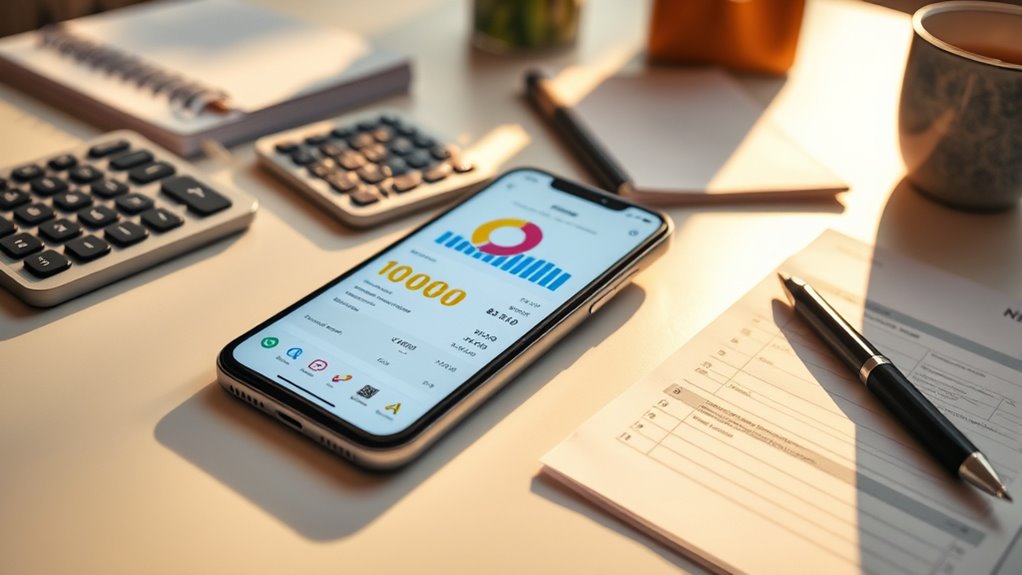To manage your money effectively, start by evaluating your current financial situation and tracking all spending. Set clear goals and create a realistic budget that prioritizes essentials and savings. Regularly monitor your expenses and build an emergency fund to protect against unexpected costs. Manage debt wisely by paying off high-interest loans first. Stick to your plan and make adjustments as needed. If you keep these steps in mind, you’ll discover simple ways to improve your financial health.
Key Takeaways
- Track all income and expenses to understand your spending habits and identify areas to cut costs.
- Set clear financial goals and create a realistic budget to prioritize savings and essential expenses.
- Build an emergency fund covering 3-6 months of living costs for financial security.
- Manage debt effectively by paying off high-interest loans first and avoiding unnecessary purchases.
- Regularly review and adjust your financial plan to stay aligned with changing goals and circumstances.
Assess Your Current Financial Situation

The first step in managing your money is to get a clear picture of your current financial situation. Start by gathering all your financial statements, including bank accounts, credit cards, loans, and bills. List your sources of income and total amount earned each month. Next, record your monthly expenses, such as rent, groceries, transportation, and entertainment. Subtract your expenses from your income to see whether you’re living within your means or overspending. Look for patterns—where does most of your money go? Are there unnecessary expenses you can cut? Being honest with yourself about your financial habits helps identify areas for improvement. This snapshot provides the foundation for creating a realistic budget and setting achievable financial goals. Additionally, understanding your financial literacy can empower you to make better money decisions moving forward. Developing a budgeting plan based on this assessment can help you stay on track with your financial objectives. Recognizing the importance of automation in business can also inspire you to implement tools that streamline your financial management processes. Implementing financial safeguards, such as setting up emergency funds, can further protect your financial stability during unforeseen circumstances. Remember, cultivating financial discipline is essential for long-term success and stability.
Set Clear Financial Goals

Have you ever wondered what you want to achieve with your money? Setting clear financial goals gives you direction and motivation. Start by defining specific objectives, like saving for a vacation or paying off debt. Break these down into short-term, medium-term, and long-term goals to stay focused. Use the table below to help clarify your priorities:
| Goal Type | Example | Timeline | Priority |
|---|---|---|---|
| Short-term | Save $1,000 for emergency fund | 3-6 months | High |
| Medium-term | Pay off credit card debt | 1-2 years | Medium |
| Long-term | Save for retirement | 10+ years | Low |
| Personal | Buy a house | 5-10 years | High |
Clear goals keep you accountable and track your progress effectively. Additionally, understanding financial literacy helps you make informed decisions about managing your money and investing wisely for future growth. Developing a grasp of AI in Business can also assist you in making smarter financial choices by leveraging technological insights and automation tools. Recognizing the importance of diversification can further protect your investments and optimize your financial strategy, especially as the landscape of personal finance continues to evolve.
Create a Realistic Budget

Creating a realistic budget is essential for managing your money effectively because it helps you understand where your income goes and highlights areas where you can cut costs. Start by listing all your sources of income, then track your expenses over a month, including bills, groceries, and entertainment. Be honest about your spending habits and set limits that match your income. Don’t underestimate or overestimate; aim for accuracy. Allocate specific amounts to each category, prioritizing essentials first. Remember, your budget should be flexible enough to accommodate unexpected expenses. Review it regularly and adjust as needed to stay on track. A realistic budget keeps you aware of your financial situation and prevents overspending, so you can work toward your goals with confidence. Incorporating savings goals, such as retirement savings plans, early on can help you build wealth over time. Additionally, understanding grocery savings strategies can further optimize your budget and reduce unnecessary expenditures. Being aware of credit scores and how they influence your financial options can also motivate responsible spending habits. Using tools like automated savings contributions can help you stay disciplined and steadily grow your savings. Furthermore, knowing the resale value of items you purchase can assist in making smarter financial decisions over the long term.
Track Your Spending

To effectively manage your money, you need to track your spending carefully. Make sure to record every expense, no matter how small, so you get an accurate picture of where your money goes. Using budgeting tools can make this process easier and help you stay on top of your financial goals. Regularly reviewing your expenditure data can help identify areas where you can cut costs and improve your savings. Incorporating financial management tools that focus on detailed expense tracking can further enhance your ability to analyze your spending habits effectively. Being aware of wave and wind in your financial environment can help you anticipate and adapt to changes that may impact your budget. Understanding your spending patterns is essential for making informed financial decisions and achieving your savings objectives. Paying attention to market fluctuations can also help you adjust your financial strategies accordingly.
Record Every Expense
Keeping track of your expenses is essential for understanding where your money goes and identifying areas where you can cut back. By recording every expense, you gain insight into your spending habits and prevent unnecessary purchases. Use a simple method like a notebook or app to log all transactions daily. To stay organized, categorize your expenses:
| Expense Category | Typical Examples |
|---|---|
| Necessities | Rent, groceries, bills |
| Discretionary | Dining out, entertainment |
| Savings & Debt | Emergency fund, loan payments |
This visual helps you see patterns and make smarter decisions. Remember, consistency is key—tracking every expense today sets the foundation for better money management tomorrow. Additionally, understanding your family background can influence your financial priorities and habits over time. Recognizing how your financial environment has shaped your attitudes toward money can help you develop healthier spending habits and set realistic goals. Developing an awareness of financial literacy is also crucial in making informed financial choices. Moreover, being aware of your spending triggers can help you avoid impulsive purchases and stay on track with your financial plan. Incorporating budgeting techniques can further enhance your ability to manage money effectively.
Use Budgeting Tools
Using budgeting tools makes tracking your spending easier and more organized. With apps or spreadsheets, you can quickly record every purchase and see where your money goes. These tools automatically categorize expenses, helping you identify spending patterns and areas to cut back. They also sync with your bank accounts, updating transactions in real-time, so you don’t miss anything. By regularly reviewing your budget, you stay aware of your financial picture and can make informed decisions. Many budgeting apps offer visual charts and reminders, keeping you motivated and accountable. Using these tools simplifies the process, saves time, and guarantees you stick to your financial goals. Consistent tracking with budgeting tools builds good habits and helps you take control of your money. Considering cookie management can further diversify your investment and secure your financial future.
Build an Emergency Fund

Have you ever wondered how to protect yourself from unexpected expenses? Building an emergency fund is your answer. Start by setting a clear savings goal—aim for enough to cover three to six months of living costs. Open a separate savings account to keep this money safe and separate from your everyday spending. Contribute regularly, even if it’s a small amount, and automate your deposits to stay consistent. Prioritize this fund over non-essential purchases until it’s fully established. An emergency fund provides peace of mind, helping you handle surprises like medical bills, car repairs, or sudden job loss without going into debt. Remember, the key is consistency and patience—building a solid cushion takes time but is worth every effort.
Manage Debt Wisely

To manage debt wisely, you should focus on paying off high-interest debts first, as they cost you the most over time. Developing clear repayment strategies helps you stay organized and motivated. By prioritizing these steps, you can reduce your debt faster and save money in the long run.
Prioritize High-Interest Debts
Prioritizing high-interest debts is essential because they can quickly spiral out of control if left unmanaged. These debts, like credit card balances or payday loans, accrue interest faster than other types of debt. To manage your money effectively, focus on paying these off first while making minimum payments on other debts. This approach reduces the total interest you pay over time, saving you money. It also helps you clear your debt faster and regain financial stability. Keep track of your high-interest debts and allocate extra funds toward paying them down. Once they’re paid off, you can shift your focus to lower-interest debts, making your overall debt management more efficient and less stressful. Prioritizing high-interest debts is a smart step toward financial health.
Develop Repayment Strategies
Developing effective repayment strategies is essential for managing debt wisely and achieving financial stability. By creating a clear plan, you can pay off debts faster and reduce interest costs. First, consider the snowball method—pay off smaller debts first to build momentum. Second, allocate extra funds toward high-interest debts to minimize overall interest paid. Third, set realistic deadlines and track your progress regularly to stay motivated. You might also consider consolidating multiple debts into a single loan with a lower rate, simplifying payments. Remember, consistency is key; making payments on time prevents additional fees and keeps your credit score healthy. Developing a solid repayment plan helps you regain control, reduces stress, and puts you on the path to financial freedom.
Make Smart Spending Decisions

Making smart spending decisions starts with understanding your needs versus wants and sticking to a budget. When you’re about to make a purchase, ask yourself if it’s a necessity or just a temporary desire. Prioritize essential items like housing, food, and transportation before splurging on non-essentials. Set spending limits for different categories to stay within your means. Avoid impulse buys by giving yourself time to think, and compare prices to find the best deal. Keep track of your expenses regularly to see where your money goes. Remember, being mindful of your spending helps prevent debt and builds savings over time. Making thoughtful choices ensures your money works for your goals, not against them.
Review and Adjust Your Plan Regularly

To keep your financial plan effective, you need to review and adjust it regularly. Life changes, expenses fluctuate, and goals evolve, so your plan must stay flexible. Set a routine, like monthly or quarterly reviews, to assess your progress. During these reviews, check if you’re sticking to your budget, reaching savings targets, and paying off debt. If you notice overspending or missed goals, tweak your plan accordingly. This proactive approach helps you stay on track and adapt to new circumstances.
- Track your spending and compare it to your budget
- Reassess your financial goals periodically
- Adjust your savings and investments as needed
Frequently Asked Questions
How Can I Stay Motivated to Stick With My Financial Plan?
Staying motivated to stick with your financial plan can be challenging, but you’re capable of it. Remind yourself of your goals regularly, whether it’s saving for a trip or paying off debt. Celebrate small wins along the way to keep your spirits high. Visualize your progress, track your achievements, and reward yourself for milestones. Keep your eye on the prize, and remember that consistency is key to long-term success.
What Are the Best Tools or Apps for Managing Money?
You’ll find apps like Mint, YNAB, and Personal Capital helpful for managing your money. These tools help you track your spending, create budgets, and monitor investments all in one place. You just link your bank accounts, set your financial goals, and let the app do the work. With real-time updates and easy-to-understand charts, you stay motivated and in control of your finances every day.
How Do I Prioritize Financial Goals Effectively?
Did you know that only 41% of Americans have a budget? To prioritize your financial goals effectively, start by identifying what’s most important to you—saving for a house, paying off debt, or building an emergency fund. Then, set clear, achievable targets for each. Focus on one goal at a time, allocate your resources wisely, and review your progress regularly to stay motivated and on track.
When Is the Right Time to Start Investing?
You should start investing as soon as you’ve built a solid emergency fund and paid off high-interest debts. The right time is when you feel financially stable and understand your investment options. Don’t wait for perfect conditions—begin small if needed. The earlier you start, the more you benefit from compound interest. So, take the plunge when you’re ready, confident, and have a clear plan in place.
How Can I Improve My Credit Score Quickly?
Think of your credit score as a garden that needs regular care. To boost it quickly, pay your bills on time, reduce your credit card balances, and avoid opening new accounts unnecessarily. Check your credit report for errors and dispute any you find. Staying consistent with these habits acts like watering your garden daily, helping your score flourish faster and opening doors to better financial opportunities.
Conclusion
Remember, managing money is like navigating a voyage; your goals are the stars guiding you. By evaluating your finances, setting clear goals, and reviewing your plan regularly, you’ll steer steadily toward financial stability. Don’t let debt and impulsive spending sink your ship. Stay disciplined, adapt, and keep your eyes on the horizon. With these tips, you’ll chart a course to a secure and prosperous future—your own Odyssey in financial mastery.










